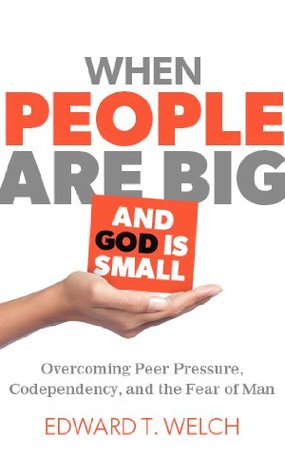More on this book
Community
Kindle Notes & Highlights
Read between
October 20, 2019 - November 19, 2021
In other words, even though I was a sinner, God loved me and made me righteous in his sight, so who cared what other people thought?!
Sometimes I would think, Is it really Christ that I am standing on, or am I standing on my perceived successes and the favorable opinions of others? After all, other people were usually very affirming. Maybe I felt good about myself because they felt good about me. Or maybe I felt good about myself because I had done respectably in athletics and had decent grades, compared to other people. Maybe I had taken pride in my ministry aspirations, compared to other people and their seemingly lower spiritual goals. Maybe I found an identity in being “nice,” or at least nicer than most of the people I
...more
“Fear” in the biblical sense is a much broader word. It includes being afraid of someone, but it extends to holding someone in awe, being controlled or mastered by people, worshipping other people, putting your trust in people, or needing people.
Do you find that it is hard to say no even when wisdom indicates that you should?
Perhaps the most dangerous form of the fear of man is the “successful” fear of man. Such people think they have made it.
“Why do I have to have someone — even Jesus — think that I am great?”
The task God sets for us is to need them less and love them more. Instead of looking for ways to manipulate others, we will ask God what our duty is toward them.
We fear people because they can expose and humiliate us.
We fear people because they can reject, ridicule, or despise us. We fear people because they can attack, oppress, or threaten us.
STEP I Recognize that the fear of man is a major theme both in the Bible and in your own life. The Fear That Comes from Shame
There is no reason why we should feel great about ourselves. We truly are deficient. The meager props of the self-esteem teaching will eventually collapse as people realize that their problem is much deeper. The problem is, in part, our nakedness before God.
Fantasy is a popular past-time behind these walls.
Another reason was that it gave her relationships without the risk of being known.
My point is that this relatively harmless fantasy is filled with fear of man, shame, and pride. It is fear of man because I am consumed with what other people might think of my klutziness. It is shame, especially the more secularized version, because I’m not feeling too good about myself. I’m feeling exposed before other people, believing that only a real jerk would be that hopeless on the dance floor. It is pride because I want to be perceived as great — at least in something.
That’s the paradox of self-esteem: Low self-esteem usually means that I think too highly of myself. I’m too self-involved, I feel I deserve better than what I have. The reason I feel bad about myself is that I aspire to something more. I want just a few minutes of greatness. I am a peasant who wants to be king. When you are in the grips of low self-esteem, it’s painful, and it certainly doesn’t feel like pride. But I believe that this is the dark, quieter side of pride — thwarted pride.
The roots of shame-induced fear of man lie in our relationship with God. We stand ultimately under his penetrating, holy gaze. When we are particularly aware that we have violated God’s righteousness, that gaze will condemn us unless we confess our sins and affirm that by faith “we have been made holy through the sacrifice of the body of Jesus Christ once and for all” (Heb. 10:10).
Paul was not a people-pleaser. He was a people-lover, and because of that he did not change his message according to what others might think. Only people-lovers are able to confront. Only people-lovers are not controlled by other people.
Fear of man is always part of a triad that includes unbelief and disobedience.
STEP 2 Identify where your fear of man has been intensified by people in your past.
The fear of man is the sinful exaggeration of a normal experience.


